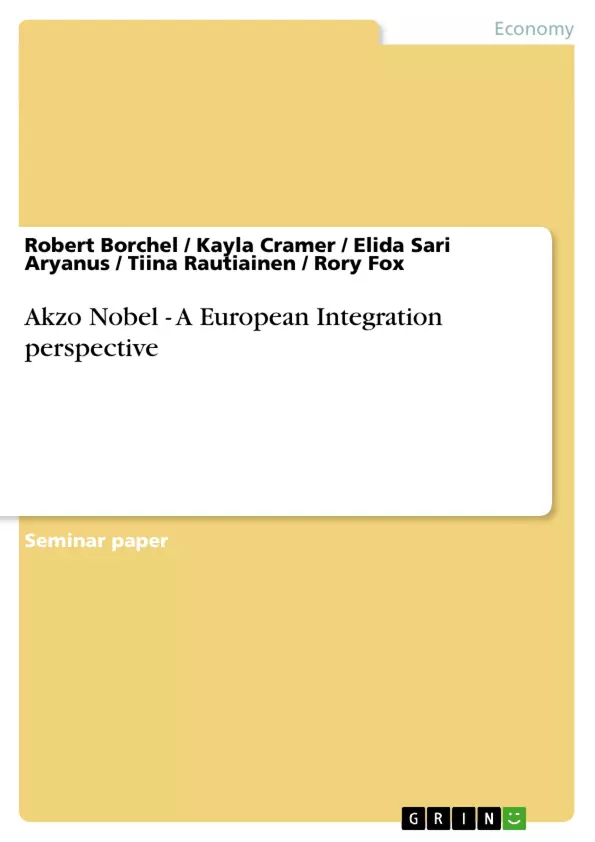The following report gives a review about the chemical company Akzo Nobel in a European Integration perspective and is based mainly at the annual report 2004. Furthermore the authors explain a European Integration perspective between Akzo and Nobel. The first part of the available report contains a brief introduction about our topic and the general economic situation in the Netherlands. In the second part the authors explain the economic aspects and give an overview about the company Akzo Nobel, the commercial and market and the company strategy. The cultural aspects are the third part of this report and show the national and company cultures and the cross-cultural alliance. In the fourth part we explain the Legal issues and show the legal structure, the market position and state aids of Akzo Nobel. With the fifth part we give a summary and conclusion about our project topic and show our opinion about the merger between Akzo and Nobel.
Inhaltsverzeichnis (Table of Contents)
- List of abbreviations
- Executive Summary
- Introduction
- Economic aspects
- Akzo Nobel Brief description
- Commercial and market
- Strategy
- Cultural aspects
- National cultures
- Akzo Nobels culture
- Cross-cultural alliance
- Legal issues
- Akzo Nobels legal structure
- Market position
- State - aid
- Conclusion
- Literature and Sources
- Appendix
Zielsetzung und Themenschwerpunkte (Objectives and Key Themes)
This report provides an overview of the chemical company Akzo Nobel from a European Integration perspective, primarily based on the 2004 annual report. It explores the integration between Akzo and Nobel, analyzing economic, cultural, and legal aspects. The report aims to understand the impact of European Integration on Akzo Nobel's operations and strategic decisions.
- Economic aspects of Akzo Nobel, including its commercial and market position, and strategic direction.
- Cultural aspects of Akzo Nobel, encompassing national cultures, company culture, and cross-cultural alliances.
- Legal aspects of Akzo Nobel, focusing on its legal structure, market position, and state aid.
- The impact of European Integration on Akzo Nobel's operations and strategies.
- The merger of Akzo and Nobel in 1994 and its implications for European integration.
Zusammenfassung der Kapitel (Chapter Summaries)
The introduction sets the stage for the report by discussing the economic context of the Netherlands, highlighting its open economy and dependence on foreign trade. It also addresses the global challenges that have affected the Dutch economy in recent years.
The section on economic aspects provides a brief description of Akzo Nobel, outlining its commercial and market presence. It then delves into the company's strategic approach, which is shaped by its position in the European marketplace and its international aspirations.
The chapter on cultural aspects examines the interaction between national cultures and Akzo Nobel's corporate culture. It explores the challenges and opportunities of building a successful cross-cultural alliance within the company.
The section on legal issues investigates the legal structure of Akzo Nobel, its market position, and the role of state aid in its operations. This section aims to analyze the legal framework within which the company operates in the European context.
Schlüsselwörter (Keywords)
Akzo Nobel, European Integration, merger, economic aspects, commercial and market, company strategy, cultural aspects, national cultures, company culture, cross-cultural alliance, legal issues, legal structure, market position, state aid.
Frequently Asked Questions
What is the main focus of this report on Akzo Nobel?
The report reviews the chemical company Akzo Nobel from a European Integration perspective, primarily based on the 2004 annual report.
Which aspects of the company are analyzed in the report?
The analysis covers economic aspects, cultural aspects (national and company cultures), and legal issues (structure, market position, and state aid).
What is the significance of the 1994 merger mentioned?
The report examines the merger between Akzo and Nobel as a case study for cross-cultural alliances and European integration.
How does the report describe the Dutch economic situation?
The Netherlands is described as having an open economy that is highly dependent on foreign trade and affected by global economic challenges.
What legal issues are discussed regarding Akzo Nobel?
The report investigates Akzo Nobel's legal structure, its market position within Europe, and the role of state aid in its operations.
- Citar trabajo
- Diplom Betriebswirt (FH) Robert Borchel (Autor), Kayla Cramer (Autor), Elida Sari Aryanus (Autor), Tiina Rautiainen (Autor), Rory Fox (Autor), 2005, Akzo Nobel - A European Integration perspective, Múnich, GRIN Verlag, https://www.grin.com/document/39763



